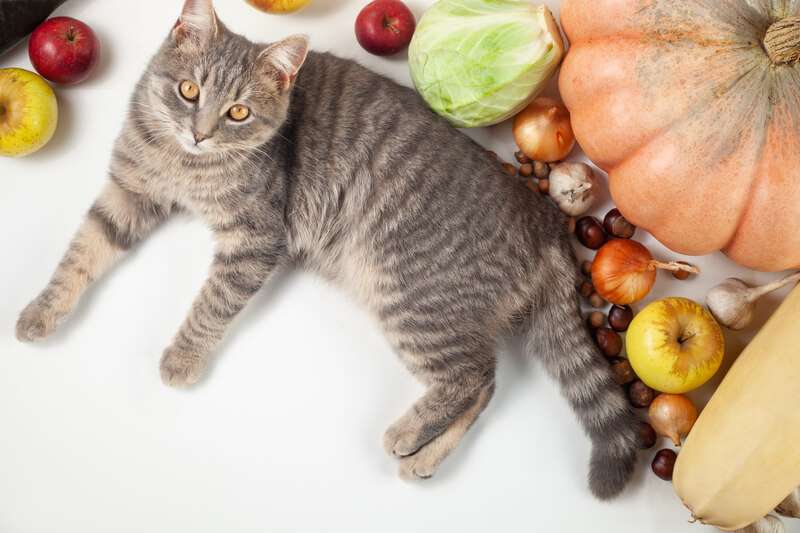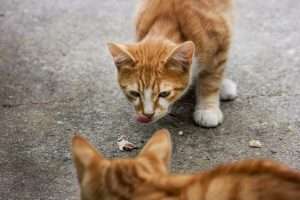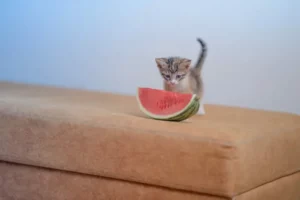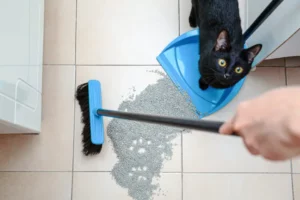Table of Contents
Can Cats eat Mango? The short answer is yes. Cats can eat mango, but they must consider several factors before doing so. We’ll go through the benefits and drawbacks of this delectable fruit and the best way to feed it so that you can make a good decision.
Can cats eat Mango?
Mangoes are generally safe for cats to eat. Sometimes, it is ok to offer your cat a small amount of Mango, even though the fruit itself is not poisonous to cats. This is because mangos, like many other fruits, have a high sugar content that makes them so appealing to humans.
Also, mangos do not provide cats with much nutritional value. Thus, cat owners should look for treats that are specifically designed for cats. Always consult your veterinarian before introducing your cat to human food.
Also, mangos do not provide cats with much nutritional value. Thus, cat owners should look for treats that are specifically designed for cats. Always consult your veterinarian before introducing your cat to human food.
Is it safe to feed cats Mango?
Animal protein in high-quality cat food is essential for cats because they are obligate carnivores. Mango contains several elements that are beneficial to humans, but cats do not require these nutrients as part of a well-rounded diet. On the other hand, Cats can synthesize their own vitamin C. Thus, this tropical fruit is ideal for them.
Adding a few pieces of Mango to your cat’s food won’t make a huge difference because they already get enough fiber from their balanced diet. As a side note, too much fiber might cause stomach problems. On the other hand, Cats are often unaffected by the fiber content in a small slice of Mango.
The high sugar content of mangos makes them unsuitable for cats that are already overweight or have underlying health issues like cat diabetes, even though a small amount of mango flesh usually is acceptable for most cats. It’s best not to provide mangos to these moggies at all.
Adding a few pieces of Mango to your cat’s food won’t make a huge difference because they already get enough fiber from their balanced diet. As a side note, too much fiber might cause stomach problems. On the other hand, Cats are often unaffected by the fiber content in a small slice of Mango.
The high sugar content of mangos makes them unsuitable for cats that are already overweight or have underlying health issues like cat diabetes, even though a small amount of mango flesh usually is acceptable for most cats. It’s best not to provide mangos to these moggies at all.
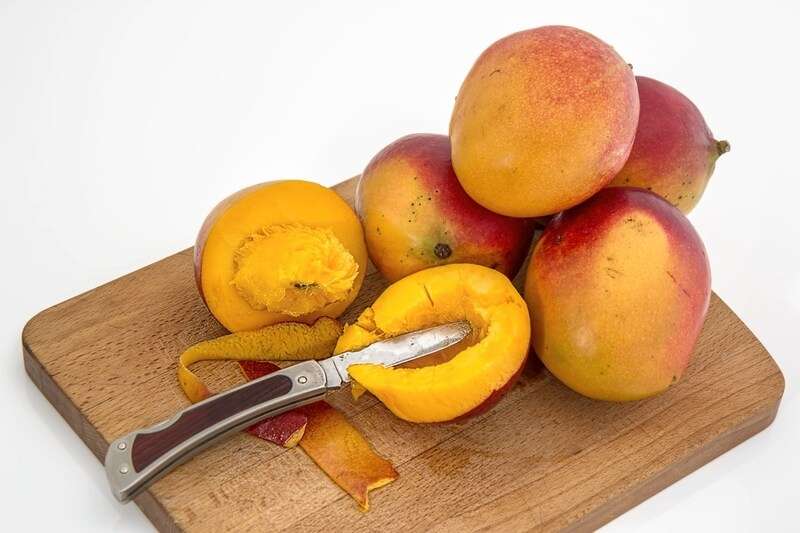
Can Kittens Eat Mango?
There is probably nothing for you to be concerned about if you discover that your kitten has consumed a very small piece of Mango by accident. However, you should be exceptionally watchful of her behavior and health because it has the potential to make her stomach upset. If your kitten is exhibiting any symptoms of illness, you need to take her to the veterinarian as soon as possible.
It is generally recommended that only the food specifically formulated for kittens be given to young cats, as kittens have specific nutritional requirements that can only be fulfilled by the food that is intended for them. Second, a kitten’s digestive system is compassionate, and if you feed her anything other than food specifically formulated for kittens, you risk upsetting their stomach.
If your feline friend has never consumed Mango before, it is best to check with your veterinarian before offering her a bite. It is possible that the same answer can be found on the Internet; however, it is essential to keep in mind that the information found on the Internet is not always a suitable replacement for the professional opinion of a veterinarian.
It is generally recommended that only the food specifically formulated for kittens be given to young cats, as kittens have specific nutritional requirements that can only be fulfilled by the food that is intended for them. Second, a kitten’s digestive system is compassionate, and if you feed her anything other than food specifically formulated for kittens, you risk upsetting their stomach.
If your feline friend has never consumed Mango before, it is best to check with your veterinarian before offering her a bite. It is possible that the same answer can be found on the Internet; however, it is essential to keep in mind that the information found on the Internet is not always a suitable replacement for the professional opinion of a veterinarian.
How Do I Feed Mango To My Cat?
- Wash thoroughly – Because Mango might contain a lot of pesticides, we recommend thoroughly cleaning it before proceeding. To help remove the toxins, soak the fruit in warm water for 10 to 20 minutes and wipe it with a vegetable brush.
- Remove the Skin and Seed — Once you’ve removed all of the chemicals, carefully remove and discard the skin. Remove and discard the seed after slicing the fruit in half.
- Chop or blend the leftover fruit until it’s roughly the consistency of their regular food.
What are the Advantages of Feeding Mango to Cats?
It is general knowledge that fruits and vegetables are nutritious nourishment for people; however, the same cannot be said for our dogs. Should they consume mangoes to satisfy their recommended daily caloric intake and fulfill the day’s nutrient requirements for them?
Mangoes do not pose a health risk to cats, but they are not required to include these fruits in their regular diet. Carnivorous animals, such as cats, derive most of their nourishment from consuming meat. It is well known that cats may hunt other animals for food in the wild.
And even though domesticated cats are accustomed to living indoors, their anatomy is still the same as that of cats living in the wild. We can’t alter the fact that they are carnivores, and their bodies require the nutrients that may be obtained through eating meat.
Mangoes are rich in various nutrients that are beneficial for cats to consume. They are loaded with the antioxidant vitamins A, B6, and C. However, several types of cats can generate vitamin C on their own.
The amount of fiber that should be included in a cat’s diet is relatively low. As a result, kids won’t fully benefit from the high quantity of fiber and vitamin C that mangoes contain. Nevertheless, the vitamin A included in mangoes can assist in boosting their resistance to illness, maintain their high level of activity, and prevent them from becoming ill in the first place.
The vast majority of cats are carnivores and enjoy raw and cooked meat. It just so happens that the vitamin B6 found in mangoes can assist cats in the digestion of the fats and proteins contained in the meat-based pet food that they consume.
Mangoes are naturally low in calories, especially when compared to other natural and commercially accessible foods for cats to snack on. Therefore, including these fruits in your cat’s diet will assist in weight management and make your pet feel appreciated and ensure that he is not deprived of the items that he enjoys eating.
Mangoes do not pose a health risk to cats, but they are not required to include these fruits in their regular diet. Carnivorous animals, such as cats, derive most of their nourishment from consuming meat. It is well known that cats may hunt other animals for food in the wild.
And even though domesticated cats are accustomed to living indoors, their anatomy is still the same as that of cats living in the wild. We can’t alter the fact that they are carnivores, and their bodies require the nutrients that may be obtained through eating meat.
Mangoes are rich in various nutrients that are beneficial for cats to consume. They are loaded with the antioxidant vitamins A, B6, and C. However, several types of cats can generate vitamin C on their own.
The amount of fiber that should be included in a cat’s diet is relatively low. As a result, kids won’t fully benefit from the high quantity of fiber and vitamin C that mangoes contain. Nevertheless, the vitamin A included in mangoes can assist in boosting their resistance to illness, maintain their high level of activity, and prevent them from becoming ill in the first place.
The vast majority of cats are carnivores and enjoy raw and cooked meat. It just so happens that the vitamin B6 found in mangoes can assist cats in the digestion of the fats and proteins contained in the meat-based pet food that they consume.
Mangoes are naturally low in calories, especially when compared to other natural and commercially accessible foods for cats to snack on. Therefore, including these fruits in your cat’s diet will assist in weight management and make your pet feel appreciated and ensure that he is not deprived of the items that he enjoys eating.

Is Mango Harmful to Cats?
Carnivores are cats
The main issue with giving Mango or any other fruit to your cat is that cats are strict carnivores. Fruit is not part of a cat’s natural diet. Thus they don’t eat it in the wild. They would rather kill mice, birds, insects, and other small creatures. Mango can disturb a cat’s fragile digestive tract, causing pain and even diarrhea because they often don’t eat it. Some cats will be more vulnerable than others, so keep an eye on them the first few times you feed them a new food like Mango.
Sugar content is high
Another issue with Mango and other fruits is their high sugar content. Too much sugar can easily lead to weight gain and other health problems. According to some estimates, up to 50% of cats over five years old are obese. Thus it’s usually best to choose healthier food.
The high sugar content can also cause tooth decay, another issue that many cats in the United States face, with experts estimating that up to 90% of cats over the age of four have some dental disease. Sugar is also useless because cats cannot taste sweet foods, most likely because they only consume fresh kills in the wild, and they don’t need that ability.
The high sugar content can also cause tooth decay, another issue that many cats in the United States face, with experts estimating that up to 90% of cats over the age of four have some dental disease. Sugar is also useless because cats cannot taste sweet foods, most likely because they only consume fresh kills in the wild, and they don’t need that ability.
The Verdict
Therefore, the answer to your question is yes, a cat can consume the flesh of a mango. Never give them the pip since it is highly poisonous to pets and poses a choking threat for them.
If you intend to offer them a slice of Mango, you should cut it into no more than one or two tiny cubes at the most. If you continue, you risk making the situation worse rather than better.
One more piece of advice: don’t go crazy. Veterinarians do not recommend that you feed your cat fruit on a daily basis because doing so can pose a health risk. Before giving your cat any new meals, you should always check with your veterinarian first if you have any doubts or questions.
You may check if your cat can eat Cucumber and Banana here!
If you intend to offer them a slice of Mango, you should cut it into no more than one or two tiny cubes at the most. If you continue, you risk making the situation worse rather than better.
One more piece of advice: don’t go crazy. Veterinarians do not recommend that you feed your cat fruit on a daily basis because doing so can pose a health risk. Before giving your cat any new meals, you should always check with your veterinarian first if you have any doubts or questions.
You may check if your cat can eat Cucumber and Banana here!


